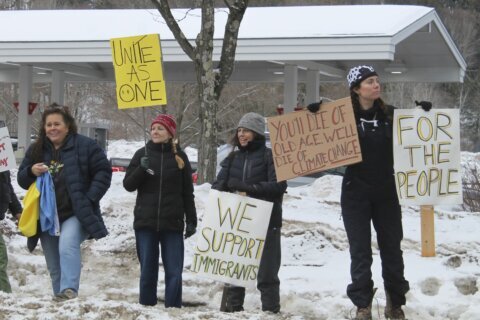NEW YORK (AP) — Forward Through Ferguson has made its mark on its community and the St. Louis region by focusing on justice and education, racial equity and policing reform.
The Missouri nonprofit was founded in 2015 to enact the societal changes outlined in the Ferguson Commission report to address the issues that contributed to the police shooting death of Michael Brown Jr. and the riots that followed in Ferguson, Missouri.
The new nonprofit and similar organizations looking to support the community saw money pour in from corporations like St. Louis-based Anheuser-Busch and major philanthropic organizations ranging from the Bill & Melinda Gates Foundation and the Robert Wood Johnson Foundation to the NBA Players Association Foundation.
It didn’t last, Annissa McCaskill, Forward Through Ferguson’s executive director, told The Associated Press.
She doesn’t want to dwell on the negative because so many have generously helped the organization. But she won’t forget the community group that pledged her nonprofit multiyear support and then decided after the first year that they didn’t want to pay anymore. “Our priorities have shifted,” the group said. Local companies that initially supported the group also stopped, “shifting priorities” again.
It’s not like her organization was ever getting the million-dollar donations that many businesses like to tout. In fact, experts say following where money from corporations and their foundations goes is very difficult.
“In many instances, it is piecemeal,” McCaskill said. “But when you put pennies in a jar, it starts to add up. Sure, I think, ’How many things do I need to do in order to get this fund endowed?’”
That lament is common throughout philanthropy, especially among organizations that rely on public donations each year rather than those, like Ivy League colleges, for example, that have large endowments that generate steady annual income. It’s also not unusual for nonprofits to see a surge in giving while their cause, from protests to weather events, is in the spotlight, only to see donations quickly dry up.
However, the racial reckoning sparked in Ferguson was supposed to be different.
This story is part of an AP ongoing series exploring the impact, legacy and ripple effects of what is widely called the Ferguson uprising, sparked a decade ago by Brown’s death.
Emerson Electric, a Fortune 500 company headquartered 1 mile (1.6 kilometers) from where Brown was killed, announced its “Ferguson Forward” initiative a month after the protests. The initiative allocated about $4 million over five years to improve education, offer scholarships to colleges and trade schools and provide business development for people in the community, hoping other area companies would match it. In 2014, Emerson earned about $2.1 billion in profit on sales of $25 billion.
Experts say there is a wide variety of reasons companies get involved with community donations, from altruistic, civic-minded ones to business-related ones including employee retention and building a stronger customer and employee base.
Recent trends suggest more corporations are providing goods and services at a reduced rate in addition to donations, rather than solely giving money to communities, said Kari Niedfeldt-Thomas, managing director and chief operations officer for Chief Executives for Corporate Purpose, a coalition that advises companies on sustainability and corporate responsibility issues.
According to CECP research, a wide-ranging definition of giving including volunteerism, community donations and providing services and products to nonprofits has jumped from 24% of a company’s overall corporate or social responsibility budgets in 2021 to 35% of those budget in 2023, Niedfeldt-Thomas said.
But the current backlash against anything that could be perceived as a diversity, equity or inclusion program is making it more difficult to measure corporate commitments, even if companies are dedicating more resources toward them, she said.
Earl Lewis, a professor and director of the Center for Social Solutions at the University of Michigan, found that lack of transparency especially striking after the outpouring of corporate pledges and statements following the murder of George Floyd in 2020.
Along with his research team, Lewis, who formerly led the Mellon Foundation, designed a database to make information about the commitments and actions taken by major U.S. corporations around racial equity more accessible.
“Maybe there was a way to actually take people at their word, that they were going to do something and then, try to figure out whether in the public domain, we could find data that would support their claims,” Lewis said, explaining they reached out to all the companies on their list and will update the results if they respond with public information.
There are few requirements for companies to make this information public, though if they give through a corporate foundation they will report outgoing grants on tax forms.
Lewis’ team, led by data scientist Brad Bottoms, searched for statements and reports from 51 of the largest U.S. companies from 2020. Just over half, or 27 of the 51 companies, made a public pledge around racial equity that year. Of the companies that didn’t make a pledge, the researchers found 10 mentioned racial equity when reporting about their donations.
Six companies that made pledges did not report in detail about how they fulfilled them, which Lewis and his team thought was a priority.
One of those companies, AT&T, did not respond to questions about whether it has fulfilled its $10 million pledge to historically Black colleges and universities.
The social media giant Meta said it fulfilled its promise to give $10 million to organizations that work on racial equity. The company also said it granted $20 million in cash and $12 million in advertising credits to 400 nonprofits serving Black communities, which Meta had not previously publicly disclosed.
Health care giant Johnson & Johnson said by the end of 2023 it had spent $80 million out of a pledged $100 million to “community-led organizations and programs” to improve racial health inequities. In April, the company disclosed a list of recipients but not how much each had received.
___
Associated Press coverage of philanthropy and nonprofits receives support through the AP’s collaboration with The Conversation US, with funding from Lilly Endowment Inc. The AP is solely responsible for this content. For all of AP’s philanthropy coverage, visit https://apnews.com/hub/philanthropy.
——
This story was first published on Aug. 23, 2024. It was updated on Aug. 26, 2024 to correct the description of Johnson & Johnson as a consumer company. It also corrected that the company disclosed its list of recipients.
Copyright © 2025 The Associated Press. All rights reserved. This material may not be published, broadcast, written or redistributed.







